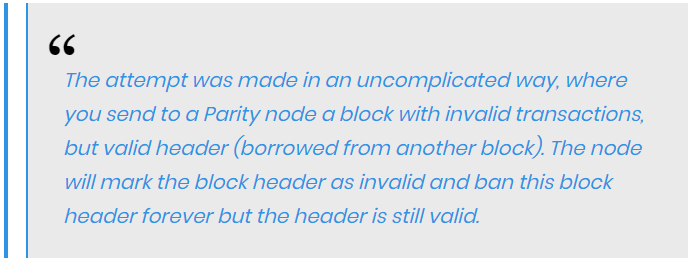Ethereum Network Fought an Intentional Attack on Its Parity Node

A recent report by several analysts has confirmed the alleged attack on blockchain cryptocurrency Ethereum. But the good news is that it has successfully overcome the attack protecting and restoring the nodes back to their normal functioning.
The security consultant of cryptocurrency, Sergio Demian Lerner, said that

Certain parity nodes lost sync in the ethereum network, on Tuesday 31st December. The cryptocurrency infrastructure firm Parity Technology asserted that the attack was at once suspected and the protection network upgrades were immediately released.
Liam Aharon, the Software developer, did an analysis over the attack and found out that the attack was very near to bringing down the whole network. He also said that Ethereum looks susceptible to more such attacks in the future in the upcoming years.
According to Aharon, an attack could not disrupt the complete network as it had a dubbed client Geth, that was deemed immune to these attacks. Thought, taking the intention into account, ethereum transitioned Parity into the ownership of DAO and a maintainer model. Hence Geth could be the one well-maintained customer in the year 2020.
Aharon added,

Endeavor to resolve these vulnerabilities of the Ethereum includes, Parity releasing multiple updates specialized to node vulnerability fixing.
In the month of May, the research collective in hacking, SRLabs, said that just two-third of Ethereum software run by Ethereum nodes had patched over a critical flaw in security found out earlier. In the month of March, the CEO of Parity, Jutta Steiner spoke that fresh, controversial Ethereum Create2 function would prevent the multisig freeze of Parity, after a user accidentally killed the multisig library of Parity by provoking the vulnerability to own the library, proceeding with self-destruction.
Earlier on the 29th of December, the IOTA holders were not able to approve transactions until 24 hours because of a mainnet incident. And due to an unusual bunch of transactions, the attack could have surfaced. Although it was insisted by the Iota Foundation that the attack wasn’t due to any software updates or issues in the network components, but happened because of the “absence of transaction processing logic for an unusual set of transactions.”
Previously, a major cryptocurrency service giant BitPay substantiated an outage in its BTC payments though it was temporary but implied a loophole that will be perpetually susceptible to attacks.



